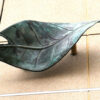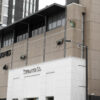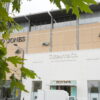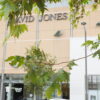‘Freed from the boundaries of time and space, I coordinate any and all points of the universe, wherever I want them to be. My way leads towards the creation of a fresh perception of the world. Thus I explain in a new way the world unknown to you.’ Dziga Vertov
Originally consisting of 10 leaves, A way of Seeing was installed on the exterior of the David Jones building on North Terrace in Adelaide in 1999/2000. After the façade of the building was remodeled to make way for Tiffany & Co, some of the leaves were removed. Currently, there are 6 leaves remaining.
Artist Bio
Born in Adelaide in 1957, Truman undertook an Associate Diploma in Jewellery and Metalsmithing between 1981 and 1985 and also studied at the School of Design, which is now part of the University of South Australia’s City West campus. In 1985, along with fellow artists Sue Lorraine and Anne Brennan, Truman established the Gray Street Workshop in Norwood (now in Sydney place Adelaide), which is dedicated to jewellery and object making. More recently, she has been involved with researching historical and contemporary anatomical collections across the world and has been a artist in residence at Flinders University, collaborating with Professor Ian Gibbins in the Autonomic Neurotransmission Laboratory.
Artist Media
Truman’s practice is recognized for its focus on a variety of media, from the use of bronze, wood and glass, through to the use of medical implements and apparatus. It encompasses, jewellery, found objects, video, image and sculpture. A way of seeing is made from a combination of patinated bronze and fibre optics.
Artist Process
Truman describes her methodology as central to her most recent anatomical inspired work. She says that collaborating is key to her art work, stating that she sees herself as a ‘thinking two-way mirror’. Her process involves observing and interpreting and reflecting on her thoughts with others, gaining a clearer perspective through their feedback in the moment or over time.
Other Public Works by this Artist
Catherine Truman also created the bronze fish for the work Fish for the Slatepool Walkway (commonly referred to as the ‘fish gates’) and designed the gate that some of the fish appear caught in. This work is featured in the Western entrance walkway near the Art Gallery of South Australia’s rear courtyard. Helen Printer developed the casting mold for this work also.








Comments